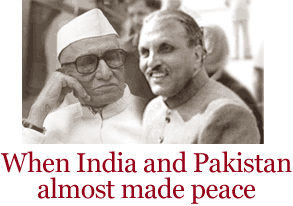The Rediff Special/ Shyam Bhatia

The occasion was the state funeral in Nairobi of Kenya's elder statesman and president, Jomo Kenyatta. Both the Indian and Pakistani leaders were present at the funeral ceremony when Zia turned to Desai and said, "I want to meet you and talk."
Shortly afterwards, the two men had a private discussion attended only by their close aides. Although the Pakistani version of the meeting has not been made available, Desai's friends say the 82-year-old prime minister told Zia, "There should be give and take. If we act in the interests of both our countries, there will be no conflict.
"We should act like brothers. I am your elder brother. I have nothing to take from you, I have everything to give. But if anything happens, you will be held responsible. I am not someone who simply talks. I take action."
Desai's former private secretary Hasmukh Shah, who lives in retirement in Baroda, confirmed the substance of the conversation and the cordiality underlying the discussions. He remembers Zia driving over to Desai's suite at the Nairobi Hilton where he told him, "You are the older brother, I am the younger."
Shah recalls Desai's joking response, "Elder brothers sometimes take younger brothers to task." He also confirms regular telephone conversations between Desai and Zia and two occasions when Zia sent over fruit baskets with maltas and kharbuzas to New Delhi.
Desai's friends claim he even reached an agreement with Zia on Kashmir. They say Zia had intended to announce the agreement during a planned visit to India, but the Janata government fell and with it was lost a precious opportunity to reach a durable agreement with Islamabad.
"Zia meant business," claim the friends. "Just before the government fell, he had made preparations to invite Desai as a state guest 'to meet the people of Pakistan.' But it was not to be. The Janata government collapsed, Desai was out of office and Indira Gandhi, the friends say, was never able to match the chemistry that existed between Desai and Zia.
"The Pakistanis trusted Morarji," recalls Shah. "With the Nehru family, it was a mutual problem. Zia had been in power long enough and was in real authority. He also knew Morarji was a straight person with whom he could strike a bargain and Morarji would stand by it."
Desai's friends say that six years after Janata lost power, Zia recognised Desai's statesmanship by naming him for Pakistan's highest honour, the Nishan-e-Pakistan. In a letter written in 1986, Zia wrote, 'I request you to
accept this. This is the wish of the people of Pakistan.'
Two years later, Zia was killed in a mysterious air crash. The despatch of the award was held up by his successor Benazir Bhutto, who blamed Desai for not intervening to save her father from the gallows.
Nawaz Sharif, who succeeded Benazir Bhutto as prime minister two years later, authorised then Pakistan high commissioner in New Delhi Abdus Sattar (now President General Pervez Musharraf's foreign minister) to ceremonially hand over the decoration.
Despite the alleged opposition of then President Ramaswamy Venkatraman, the nonagenarian Desai received the Nishan-e-Pakistan at a private ceremony at his home in Bombay on May 19, 1990.
Morarji Desai thus remains the only Indian to have won both the Nishan-e-Pakistan and the Bharat Ratna.
Morarji Desai's photograph: Mukesh Parpiani. Zia ul Haq's photograph: Saab Press. Page design: Dominic Xavier
The Rediff Specials